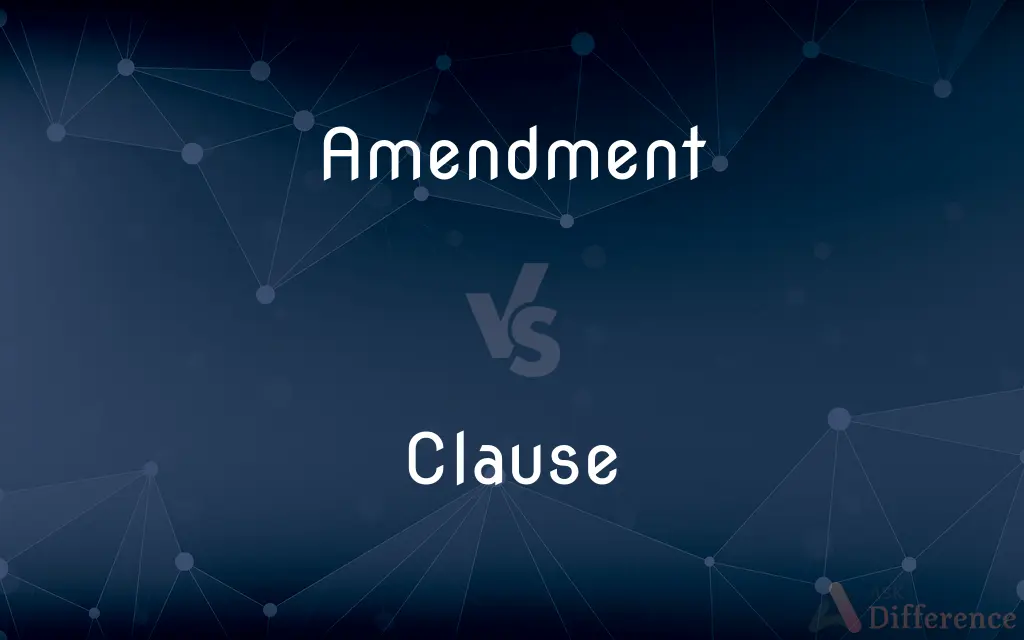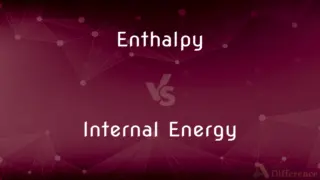Amendment vs. Clause — What's the Difference?
Edited by Tayyaba Rehman — By Fiza Rafique — Published on October 15, 2023
An Amendment is a formal change or addition proposed, ratified, or made to a document, typically a constitution or law; a Clause is a distinct provision or section within a legal document.

Difference Between Amendment and Clause
Table of Contents
ADVERTISEMENT
Key Differences
The terms "amendment" and "clause" are often associated with legal, legislative, and contractual documents, but they serve different functions within these contexts. An amendment refers to a formal change or addition made to an existing document. It’s an alteration made after the original document is finalized, intended to update, improve, or clarify certain aspects.
On the other hand, a clause is a distinct section or provision in a document that deals with a specific point or topic. Clauses are essential components of many legal texts, including contracts, wills, and statutes. They help break down complex documents into manageable parts, each focusing on a particular aspect or detail.
Amendments can be standalone or integrated into the text they modify. For example, in the U.S. Constitution, there are several amendments that have been added over time, reflecting changes in society and governance. Each amendment stands as a testament to the evolving nature of the nation’s foundational law.
In contrast, a clause can be thought of as a building block of a document. In contracts, for instance, you might find a confidentiality clause or an arbitration clause, each detailing specific conditions or procedures related to the contract. It's the granular breakdown of stipulations, rights, or obligations.
Comparison Chart
Definition
A formal change or addition to a document.
A distinct provision or section within a written document.
ADVERTISEMENT
Function
To modify or update an existing document.
To detail a specific point or topic within a document.
Usage
Often added after a document's completion.
Integral part of many legal texts from the outset.
Nature
Reflects evolution or change in a document.
A foundational building block of a document.
Example
U.S. Constitution has several amendments.
Contracts often have confidentiality clauses.
Compare with Definitions
Amendment
An alteration proposed or effected by parliamentary or constitutional procedure.
The amendment was ratified by 3/4 of the states.
Clause
A distinct article or provision in a contract, treaty, or other formal document.
The contract's non-compete clause prevented her from working for competitors.
Amendment
The process of correcting or revising a text.
The editor made several amendments to the manuscript.
Clause
A section of a legal document that relates to a particular point or issue.
The will contained a clause about charitable donations.
Amendment
The act of changing for the better; improvement
"Society may sometimes show signs of repentance and amendment" (George G. Coulton).
Clause
A distinct section in a document or piece of legislation.
The clause about data protection was rigorously debated.
Amendment
A correction or alteration, as in a manuscript.
Clause
A unit of grammatical organization next below the sentence in rank.
The clause when the rain stops specifies the condition.
Amendment
The process of formally altering or adding to a document or record.
Clause
(Grammar) A group of words containing a subject and a predicate and forming part of a compound or complex sentence.
Amendment
A statement of such an alteration or addition.
Clause
A distinct article, stipulation, or provision in a document.
Amendment
Amendment One of the provisions in the US Constitution protecting individual rights.
Clause
(grammar) A verb, its necessary grammatical arguments, and any adjuncts affecting them.
Amendment
A material, such as organic matter or sand, mixed into soil to improve growing conditions.
Clause
(grammar) A verb along with its subject and their modifiers. If a clause provides a complete thought on its own, then it is an independent (superordinate) clause; otherwise, it is (subordinate) dependent.
Amendment
An alteration or change for the better; correction of a fault or of faults; reformation of life by quitting vices.
Clause
(legal) A separate part of a contract, a will or another legal document.
Amendment
In public bodies, any alteration made or proposed to be made in a bill or motion that adds, changes, substitutes, or omits.
Clause
To amend (a bill of lading or similar document).
Amendment
(legal) Correction of an error in a writ or process.
Clause
A separate portion of a written paper, paragraph, or sentence; an article, stipulation, or proviso, in a legal document.
The usual attestation clause to a will.
Amendment
An addition to and/or alteration to the Constitution.
The First Amendment guarantees freedom of religion, speech, press, assembly, and petition.
The Thirteenth Amendment to the United States Constitution abolished slavery.
Clause
A subordinate portion or a subdivision of a sentence containing a subject and its predicate.
Amendment
That which is added; that which is used to increase or supplement something.
A soil amendment
Clause
See Letters clause or Letters close, under Letter.
Amendment
An alteration or change for the better; correction of a fault or of faults; reformation of life by quitting vices.
Clause
(grammar) an expression including a subject and predicate but not constituting a complete sentence
Amendment
In public bodies; Any alternation made or proposed to be made in a bill or motion by adding, changing, substituting, or omitting.
Clause
A separate section of a legal document (as a statute or contract or will)
Amendment
Correction of an error in a writ or process.
Clause
A particular and separate article, stipulation, or proviso in a treaty, bill, or contract.
The insurance policy had a clause about natural disasters.
Amendment
The act of amending or correcting
Amendment
A statement that is added to or revises or improves a proposal or document (a bill or constitution etc.)
Amendment
A statement of a change, especially in a legal contract.
The lease had an amendment detailing new payment terms.
Common Curiosities
How does a clause function in a document?
A clause details a specific point or topic within the document.
Are clauses only found in legal documents?
No, clauses can also be found in grammatical structures and other written materials.
What is an amendment?
An amendment is a formal change or addition to a document.
Can an amendment itself have clauses?
Yes, an amendment can be detailed and have multiple clauses.
Are all clauses in a contract legally binding?
Typically, yes, but it depends on the nature of the contract and jurisdiction.
How does a clause affect the interpretation of a document?
A clause provides specific details or conditions that clarify the document's intent or stipulations.
Can a document be amended multiple times?
Yes, as long as the proper procedures are followed.
How is an amendment added to a constitution?
Typically, through a defined legislative or constitutional procedure.
Can a clause stand alone outside a document?
No, a clause is integral to a document and details specific points within it.
Why are amendments important in legislation?
Amendments allow legislation to evolve and adapt to changing circumstances.
How do amendments differ from revisions?
Amendments are formal changes, while revisions can be broader, encompassing edits or rewrites.
Who can propose an amendment to a law or constitution?
It varies by jurisdiction but often legislators, constitutional bodies, or even citizens in some cases.
What might lead to the inclusion of a clause in a contract?
Specific stipulations, conditions, or details parties want to highlight.
What's an example of a famous amendment?
The First Amendment to the U.S. Constitution guarantees freedoms like speech and religion.
Share Your Discovery

Previous Comparison
Moisturizer vs. Cold Cream
Next Comparison
Enthalpy vs. Internal EnergyAuthor Spotlight
Written by
Fiza RafiqueFiza Rafique is a skilled content writer at AskDifference.com, where she meticulously refines and enhances written pieces. Drawing from her vast editorial expertise, Fiza ensures clarity, accuracy, and precision in every article. Passionate about language, she continually seeks to elevate the quality of content for readers worldwide.
Edited by
Tayyaba RehmanTayyaba Rehman is a distinguished writer, currently serving as a primary contributor to askdifference.com. As a researcher in semantics and etymology, Tayyaba's passion for the complexity of languages and their distinctions has found a perfect home on the platform. Tayyaba delves into the intricacies of language, distinguishing between commonly confused words and phrases, thereby providing clarity for readers worldwide.














































